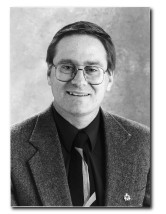From the director's desk . . .
 |
|
Director
Scott Stevens |
Dear ELI Friends,
Reading this, many of you are preparing to usher in the New Year, which in nearly every culture fills people with dreams of a better tomorrow. For many, however, after September 11th, fear cast a long shadow, dimming the bright promise of 2002. In the early aftermath of the tragedy, some in politics called for a temporary closing of American borders to student visa seekers. On other continents, ministries considered recalling their students from the States and universities pondered canceling study abroad programs. And in that one dark hour, mutual trust seemed eclipsed by fear as legitimate concerns for security became terribly confused and entangled with isolationism.
Gradually, however, voices of reason prevailed. On October 2nd, Assistant Secretary of State Patricia Harrison declared that international educational exchange programs must continue. She recognized that as long as the barriers of geography, language, and culture divide nations, then everyone remains vulnerable to those who would exploit such divisions to sow seeds of mistrust and enmity.
Studying abroad overcomes these barriers, replacing ignorance with understanding, distrust with respect, and intolerance with acceptance. Educational exchanges prove a simple precept: it is far more difficult to raise a hand in anger against a friend than an enemy. Exchanges have gained our country many friends. The heads of state of two thirds of America's closest allies have been educated or trained in the United States. True diplomacy begins with study abroad programs.
Since 1979, ELI has been a training center for cross-cultural diplomacy, graduating some 10,000 "ambassadors" of peace and reconciliation. All have earned their "diplomatic credentials" by studying among a community of learners as diverse and colorful as the world itself. United in the common goal of mastering English, they had to learn to connect before they could communicate, to cross the great divide of culture, religion, and, in many cases, historical antipathy. Most of all, they had to learn to listen.
The most powerful moments at ELI are those when students really listen to classmates' stories, classmates who might be received back home with indifference, intolerance, or even hostility. Hauntingly familiar portrayals of individual dreams and struggles touch people on a personal level. Drawn together by shared experience, students see each other transformed. Labels and stereotypes dissolve, and these strangers suddenly stand as friends, sisters, brothers.
Although this process has been repeated often, it always delights ELI teachers, staff, and host families, who know that ELI is much more than a center for language training and academic or professional preparation. Rather, it is home to learners from many nations who achieve what no treaty could ever accomplish: friendships forged with open hearts and minds.
Dozens of encouraging letters from past students fill me with hope as I greet the New Year. Each of us has the opportunity to respond to hatred and bigotry by either building bridges or walls, by reaching out to the world or withdrawing from it. I feel privileged to be in the profession of bridge builders who work to span the gulfs between cultures. I also take heart at the vision of ELI's 10,000 graduates joining the millions of other beneficiaries of international educational exchange who promote understanding and respect.
In words suggestive of the "do unto others" commands of Christian scripture, a Muslim prophet once wrote, "No man has believed perfectly until he wishes for his brother what he desires for himself." In the year to come, may we all strive to have such wishes for each other.
Sincerely,
![]()
Scott G. Stevens
Director